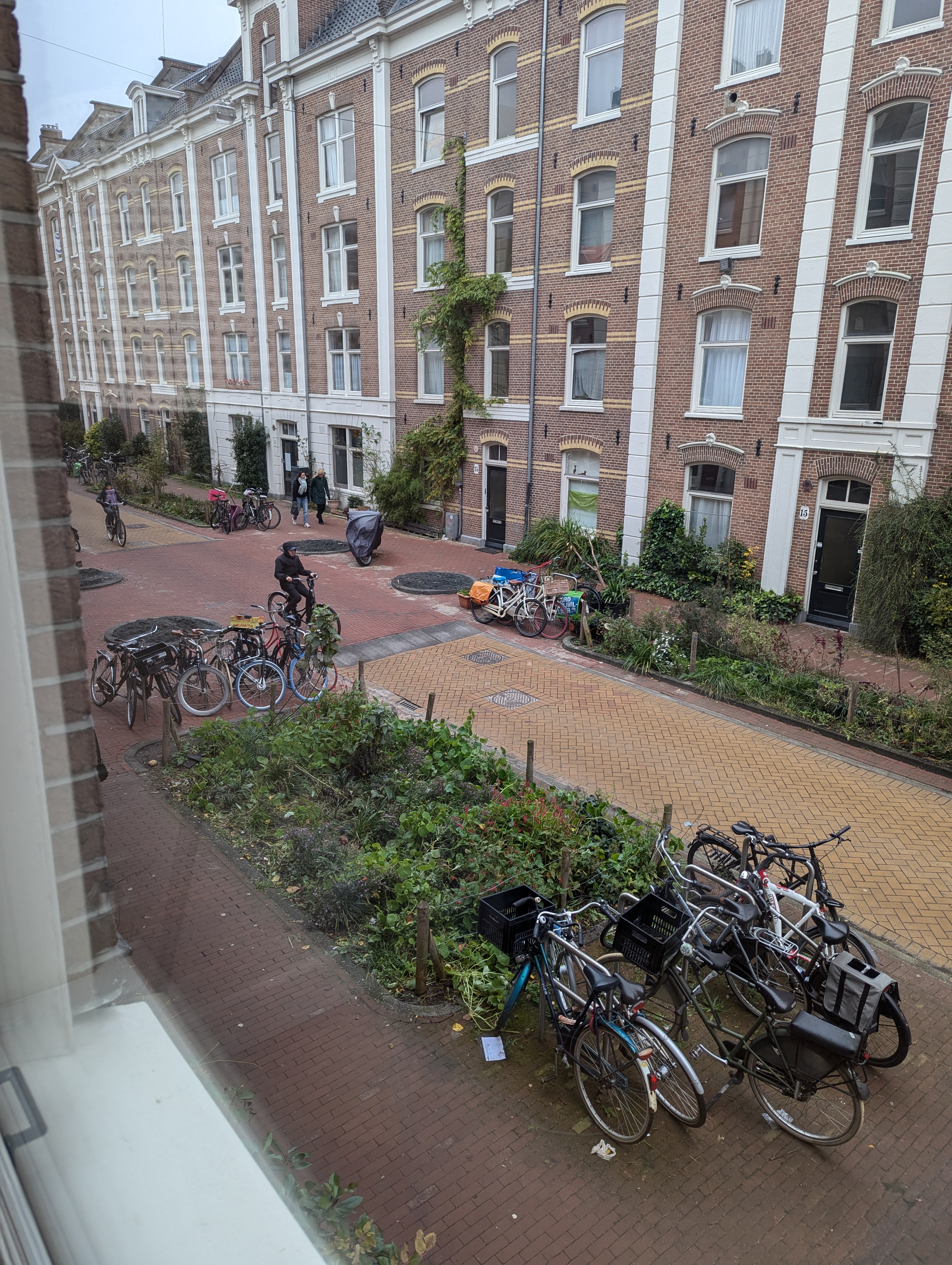Return to the search form Return to your search results
Community, Public Health, and Gerontological Nursing Practicum Abroad
Fast Facts
Sessions Offered:
Spring, Fall
Location:
Amsterdam, Netherlands
Credit:
Resident
Eligibility:
Students must be in good academic and disciplinary standing. Good standing with the College of Nursing including a minimum 2.5 GPA. See Application tab for all prerequisites.
Spring 2026 Application Deadline:
September 26, 2025
Academic Program
The AACN Essentials: Core Competencies for Professional Nursing Education stresses the importance of providing immersion experiences for undergraduate nursing students to increase self-confidence, initiate a sense of professional identity and belonging in the profession, and provide opportunities for students to integrate learning and competencies into more complex situations.
This 2-credit program, developed by University of Iowa nursing faculty, is an incredible opportunity to gain firsthand experience in a different healthcare system while focusing on older adult care. The Netherlands is known for its progressive approach to elder care, including person-centered care models, innovative nursing home designs, and strong community-based support systems.
This course is open to both pre-licensure and RN-BSN students. This course will count as NURS:3655:0002 Community and Public Health Nursing Practicum: Global Health Netherlands for RN-BSN students. For pre-licensure students, this course will count as NURS:3625:0001 Gerontological Nursing Practicum: Global Health Netherlands. RN-BSN students will meet online several times prior to departure. Pre-licensure students are enrolled in this experience as part of their Gerontology Practicum. As part of that practicum, prior to travel, students will meet with their course section for an orientation, complete 5 clinical days in a long-term care setting (on Wednesdays and Thursdays odd weeks starting week 3), and meet for in-person seminars on Fridays from 8:30-9:30am on odd weeks throughout the semester.
This program is scheduled to run in both spring and fall. The current website provides information for the spring 2026 program. Information for fall 2026 will be posted when available.
Course Objectives

During the program students will be able to:
- Explore the role cultural perspectives have in older adult community and health care settings in the Netherlands and summarize the impact on patient health outcomes
- Analyze optimal aging strategies and age friendly healthcare practices utilized in the Netherlands and compare those to the United States
- Describe how healthcare policy, regulation and financing impacts nursing practice of older adults in the Netherlands
- Demonstrate effective teamwork and interprofessional communication with local health care providers, families and communities in the Netherlands.
Program Activities
Students will engage in a mix of academic and cultural activities. Activities may include:
- A tour, presentation, and BP clinic with Hogeweyk Dementia Village
- Connecting with a local nursing program. UI students might give a presentation and shadow the nursing students at a local hospital
- A visit to Spaarne Gasthuis Hospital
- A visit involving one of the following: rural health exploration, primary care clinic, acute care hospital, ambulance services run my nurses, farming with older adults
- Public health agency visits and presentations
- Guided bike tour of Amsterdam
- Anne Frank House
- Van Gogh Museum
- Traditional Dutch stamppot cooking class
Program Dates
The travel portion of the spring 2026 course is scheduled to run April 17, 2026-April 26, 2026. In order to arrive on April 17, students will likely need to depart on April 16, 2026.
For More Information
For more details about academic content, contact the program leaders:
Emily Griffin, Assistant Professor
Betty Mallen, Assistant Professor
Shalome Tonelli, Assistant Professor
For questions about the application or program logistics, contact the study abroad program coordinator, Lindsay Budde, at Lindsay-budde@uiowa.edu.
The Netherlands

The Netherlands today is one of the world's most prosperous countries, thanks to its advanced industries and agriculture, its role in world trade and its large reserve of natural gas. A highly developed system of social welfare is meant to ensure that everybody in the Netherlands can share in this prosperity.
The Netherlands is one of the most densely populated countries in the world. Around 18 million people live in an area of approximately 37,000 square km. Sixty per cent of the population lives in the western part of the country, which is called Holland. This name is often used to refer to the Netherlands as a whole.
Though the country may be tiny in size, its friendly people, fascinating culture and charming cities make it one of the most grandly charismatic places in all of Europe. Hop on a bike and explore the country's many picturesque windmills, canal cities and breathtaking garden. The Netherlands' central location in Europe makes it an ideal place to begin one's journey to other nearby countries.
Amsterdam
This program in based in Amsterdam, capital city of the Netherlands and commonly known as “Venice of the North." It's easy to feel at home with the more than 750,000 easy-going and welcoming residents of this cosmopolitan center, which still manages to retain its small-town feel. Study abroad in Amsterdam and you’ll experience a city that is full of life both day and night with world-renowned museums, art galleries, music, opera, theater, and dance, not to mention some of the most forward and liberal social ideas.

US Department of State Country Information
The US Department of State provides safety and security information for every country of the world to help you assess for yourself the risks of travel. Each country information page contains a Travel Advisory, Alerts, and other important details specific to that country that could affect you.
Pay close attention to the entry and exit requirements, local laws and customs, health conditions, and other details to help decide whether traveling to any given country is right for you. Non-US citizen travelers may also wish to seek guidance from the embassy of their country of citizenship. The UI International Travel Policy for Students addresses restrictions on student travel to high-risk locations and engagement in high-risk activities abroad.
Living Arrangements
Students will stay in luxury hostel accommodations in room with 1-3 other program participants. Breakfast is provided by the hostel.
Passport

If you do not have a passport, it is important that you apply for one as soon as possible to ensure you receive it before the program begins. US citizens can find more information about how to apply for a passport on the US Department of State’s website.
US citizens can find more information about how to renew a passport on the US Department of State’s website.
Students with a valid passport should check the expiration date. Passports must be valid for at least 6 months AFTER the anticipated return to the US from studying abroad. If your passport is not valid for at least 6 months after your anticipated date of return to the US, you must renew your passport before applying for the visa you will need to enter your host country.
Expedited processing service is available for US passports (although this still takes several weeks and is at an additional cost). UI Study Abroad encourages students to ask the passport agency at the time of application whether expedited service is recommended.
Non-US Citizens
Students who are not US citizens should contact their consulate for more information if they need to get a new passport, renew their passport, or get a visa.
Travel Arrangements

Students will be provided with a suggested flight itinerary after the confirmation deadline. Since travel will take place during the semester, it is recommended that students purchase the suggested flights.
Public transportation passes for the students will be provided for the duration of the program.
Eligibility
This program is open to UI students who fulfill the following requirements:
- Must be in good academic standing according the College of Nursing: This includes having a 2.5 GPA or higher.
- Good academic and disciplinary standing: Students must be in good academic and disciplinary standing at the University of Iowa. Academic and disciplinary history will also be considered when determining whether a student is prepared to represent the University of Iowa as part of this program. Students who, even after being accepted into a program, are put on either academic and/or disciplinary probation for any period of time overlapping with the study abroad program dates are ineligible to study abroad. In these cases, students must forfeit their acceptance, will not be allowed to study abroad, and are wholly responsible for any and all financial expenses incurred.
- Demonstrated preparedness and maturity: Students must meet entry requirements for the countries and venues visited by the program. Students must demonstrate preparedness to take on the heightened responsibilities associated with international study and travel and demonstrate a commitment to behave responsibly abroad while respecting cultural differences. Students are expected to obey both local laws and program directives conveyed to participants before and during the program. The University of Iowa Code of Student Life applies to all program participants while abroad.
- The $50 application fee is billed to students' U-bills after submitting the online application.
- The Course Fee, Study Abroad Fee, and CISI Insurance fee are billed to confirmed students' U-bills after registration.
- All other amounts are estimated out-of-pocket expenses and will vary for each participant.
Costs
The cost sheet outlines the total estimated costs associated with participating in this program and can be used for financial aid and planning purposes. It includes fees charged on students’ U-Bill ($50 application fee, course fee, Study Abroad Administrative Fee, and mandatory Iowa Regents CISI Travel Insurance), as well as out-of-pocket expenses. Actual out-of-pocket expenses will vary from individual to individual. Please see the respective websites for further details. Contact the UI Study Abroad advisor with questions regarding the cost sheet.
Course Fee
The spring 2026 course fee is $3,200. The course fee does not include the Application Fee, Study Abroad Administrative Fee, CISI Travel Insurance, or out-of-pocket expenses, all of which are listed in the cost sheet. It does include academic instruction, guided tours in Amsterdam, in-country transportation, a welcome meal, and accommodations.
Spring 2026 Cost Sheet
Key points to note are:
Scholarships & Financial Aid
Students are encouraged to apply for Need-based, Merit, and Global Access Ambassador scholarships awarded by Study Abroad. More information is available on the Scholarships page.
Students who receive a Federal Pell Grant are eligible to apply for the Gilman International Scholarship, an external scholarship awarded by the Department of State. Learn more here.
Financial aid received to attend the University of Iowa (scholarships, grants, and loans) may be applied toward the program cost. Students are encouraged to speak with someone in Financial Aid to explore financial aid options.
How to Apply

*The application will open September 8, 2025
The application process requires:
• Completing the online application demographic information and short answer questions
• Completing the statement of purpose questions (found in the application) and uploading them to the application
• Uploading a copy of the information page of your passport (if you are applying for a passport, please indicate this on the application and you can bypass this requirement temporarily)
Students who submit an application will be U-billed a $50 application fee.
IMPORTANT:
Please note that this program may be competitive and there is a possibility that some applicants may be waitlisted. We cannot guarantee placement in the program if students are waitlisted.Application Deadline
September 26, 2025
Confirmation Materials

Acceptance
Students who are accepted to the spring 2026 program will be notified after the application deadline. In the email notifying students of their acceptance, students will be given instructions on how to confirm their spot on the program. Students need to confirm their spots before the deadline.
Flights
Flight information will be provided to all participants via email. Do not purchase a flight until you receive flight instructions.
Health & Safety Planning
All students preparing to study abroad should review the following:
Iowa Regents CISI Health Insurance Information
Students are also encouraged to complete the Health Preparation Guide for International Travelform with their medical practitioner. This document is intended to help you plan for your medical needs abroad. Please DO NOT turn this form in to UI Study Abroad.
Orientation

To prepare for your time abroad, you are required by the University of Iowa to complete two orientations.
Online Education Abroad Pre-Departure Orientation
You are required to complete the International Programs ICON course “Education Abroad Pre-Departure Orientation” prior to departure. This orientation is mandatory for all students going abroad under the auspices of the University of Iowa. It covers many practical matters about living overseas, such as health and safety, communication, money, goals, and much more. You will be enrolled in this course by International Programs and an email will be sent to you once enrolled. If you have questions, you can email safety-abroad@uiowa.edu.
Program-Specific Orientation
A mandatory, in-person orientation will be facilitated by the Faculty Leader and Study Abroad Coordinator before departure and will cover content specific to your program and host country.




